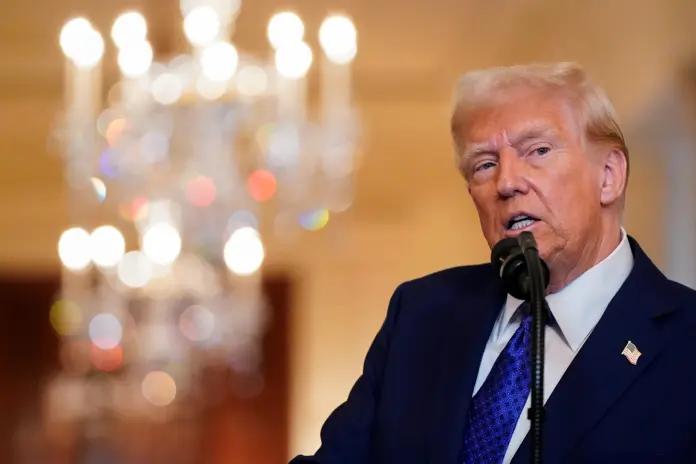Trump-Backed GENIUS Act Sparks Crypto Controversy in Washington: A bipartisan bill titled the GENIUS Act to deregulate stablecoins is bringing heat to Washington, especially since the bill is for amortizing stablecoins in general, not just Tether. At first blush, legislation wending its way through the Senate seemed destined for wide support, but the revelation of former President Donald Trump’s deepening ties with the cryptocurrency industry has turned the tide, with major pushback from Democrats. The critics warn that without key ethical safeguards, the bill would enable financial conflicts of interest in high places.
Trump’s Expanding Crypto Empire Raises Ethical Concerns
And at the center of the controversy: a massive new deal between an Abu Dhabi-backed investor group and World Liberty Financial, a crypto firm closely tied to the Trump family. This includes the purchase of $2 billion worth of stablecoins linked to World Liberty for investment into the crypto exchange … Crypto is thought to represent nearly 40 per cent of Donald Trump’s total net worth, according to some reports, substantially boosting the value of the digital asset in a single deal.
Additionally, the Trump family has released meme coins of its own—$TRUMP and $MELANIA—and they have contributed greatly to the Trump family’s growing crypto fortune. However, as President Trump’s administration continues supporting lighter regulation of the cryptocurrency industry, even stablecoins included, this raises serious ethical questions.
Senate Democrats Oppose GENIUS Act Over Conflict of Interest Risks
But Senate Democrats have seconded that notion, questioning the timing of the GENIUS Act — legislation that would create a legal framework for regulating stablecoins that has never existed before. Also, they say that they were not captured in the sufficient safeguards against corruption included in the bill, considering that the country’s sitting president is so financially wrapped in the industry. In the document presented by Senator Elizabeth Warren, a longstanding crypto critic, she has indicated that the amendments to the bill would ban elected officials and their family members from owning or profiting from crypto assets, including stablecoins.
End Crypto Corruption Act, which would force those same ethical rules would be imposed, was also introduced by Senator Jeff Merkley. “Any person who wants to influence the president can now enrich him directly by buying his crypto.” ‘This is not just unethical, it’s dangerous,’ Merkley said in a statement.
Also read: Acquittal in Tyre Nichols Case Sparks Backlash
Congressional Tensions Stall Progress on the Stablecoin Bill
The negotiations have been complicated by the backlash. The Senate has already opened the door to minor changes, as Republican Senate Majority Leader John Thune has indicated his support for a few revisions but urged them to be considered before the bill proceeds. But, Democratic Leader Chuck Schumer has counselled his caucus against committing to a vote until there is substantial rewriting of that legislation. Senators such as Ruben Gallego have accused Republicans of trying to rush the legislation to pass without first addressing significant consumer and anti-money laundering protections.
Lawmakers Demand Transparency in Trump’s Crypto Dealings
Furthermore, an investigation into Trump’s crypto dealings has been launched by Senator Richard Blumenthal. Letters have been delivered to World Liberty Financial and Fight Fight Fight LLC, the operator behind the $TRUMP coin, asking for records of communication between the Trump Organization, the administration, and foreign governments.
The Trump camp has defended itself so far. The President’s assets are in a trust that’s managed by the President’s children, and ‘there is no conflict of interest,’ a White House spokesman said. But the administration says the passage of the GENIUS Act will help America become the ‘crypto capital of the world.’”
GENIUS Act Becomes a Test of Crypto Policy and Political Ethics
While the GENIUS Act in itself symbolizes a struggle in a forum that is more and more powerful, influential, and in politics, the GENIUS Act is part of a bigger conflict. Now, lawmakers must decide if the technology industry has moved too fast or if the public’s protection should come before clear rules to prevent political abuse. Crypto companies have billions of dollars on the line and a legacy to build, as the stakes of this legislative battle could determine the future of both crypto and democratic transparency in the United States.








